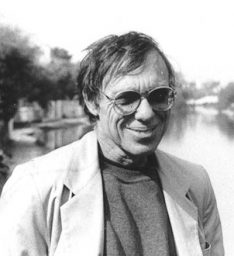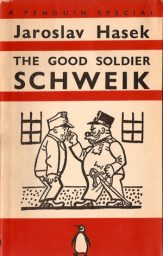The Strange Career of Robert Sheckley
Saturday , 15, April 2017 Authors, Fiction, Short Fiction 8 CommentsScience fiction writer Robert Sheckley was born in New York City in 1928 and died there in 2005. He lived most of the intervening years in the United States. And yet, he was never more than a moderate success in his native land. 
His short stories attained some popularity, with a few being adapted into lesser movies and television episodes, but Sheckley was never a major force critically or commercially. Many well-read science fiction fans will reply to his surname with a blank “Who?”. And even those who have heard of Sheckley can be forgiven for failing to come up with a single novel he authored. He had 2 Hugo nominations but no wins, and didn’t come close to the success of two of his co-authors, Harry Harrison and Harlan Ellison. My local library had only one of his books back in 2003. Now, it has none.
And yet, in a country where Sheckley never lived, the Soviet Union, he is regarded as a legend of the genre. My parents and all their friends talked about ravenously reading anything they could find by him in 70s and 80s Moscow. Many Sheckley works practically unavailable in English are easily found in a Russian online library. Even posthumously, his reputation remains high. In a Russian-language discussion last year featuring many younger respondents, they were asked to name the three greatest science fiction writers ever. Sheckley was among the first names, and perhaps the one mentioned most often, right up there with Heinlein and Asimov. Curiously, another major discrepancy compared to any English-language list is the almost total absence of Clarke. Fittingly, one of Sheckley’s last public appearances was at a Ukrainian science fiction convention in early 2005.
What accounts for this massive difference in Sheckley’s reputation? His stories were not set in or related to the Soviet Union. The writing is imaginative and action-packed, but so is that of many other American science fiction writers. Some of Sheckley’s short fiction, with their humor and devilish twist endings, remind me of the quintessentially American O. Henry.
And that, I believe, is connected to his popularity in my birth country. Sheckley was a master of black humor. Some of his works, whose comical, adventurous style reminds me of frequent co-writer Harry Harrison, became utterly terrifying and grim in the last few paragraphs. Paragraphs completely consistent with everything else in the tale, which makes them especially horrifying and memorable. A fine example is Welcome to the Standard Nightmare, a first encounter story about a space explorer coming upon a pacifist, friendly, idealistic humanoid alien civilization. The boisterous, hilarious romp ends with a portent of certain doom based on nothing more than the la st few lines.
st few lines.
 This quality, so rare among Western writers, combined with the excitement and humor of his tales, is what makes Sheckley uniquely attractive to a Soviet audience. There is an excellent comparison to be made to The Twelve Chairs and the Czech The Good Soldier Švejk, two of the most widely read, beloved classics in the Soviet Union during the 20th century. At certain points in Soviet history, if one was unfamiliar with either work, they were either considered an illiterate idiot or a foreign, capitalist spy. Possibly both.
This quality, so rare among Western writers, combined with the excitement and humor of his tales, is what makes Sheckley uniquely attractive to a Soviet audience. There is an excellent comparison to be made to The Twelve Chairs and the Czech The Good Soldier Švejk, two of the most widely read, beloved classics in the Soviet Union during the 20th century. At certain points in Soviet history, if one was unfamiliar with either work, they were either considered an illiterate idiot or a foreign, capitalist spy. Possibly both.
Those two are also masterpieces which are as brilliantly humorous as they are dark. And that, I believe, is the core of Sheckley’s appeal. If the reader wishes to see whether Sheckley is underrated in the US or overrated in countries of the former Soviet Union, Project Gutenberg has a number of his works. While the short stories are from his earlier years and don’t fully represent his powers at their peak (although all are at least decent, and Watchbird, Diplomatic Immunity, and Bad Medicine are highly recommended), there is one full novel, The Status Civilization, which I encourage every science fiction fan to read.
Mind Swap is good stuff. I’ll have to go on a binge, since you brought it up. This is my favorite sort of sci fi
“Curiously, another major discrepancy compared to any English-language list is the almost total absence of Clarke.”
Score one for the Russians.
“Project Gutenberg has a number of his works. […] There is one full novel, The Status Civilization, which I encourage every science fiction fan to read.”
It’s interesting that a full novel by somebody who died so recently has apparently lapsed into the public domain. That’s not especially uncommon for short stories, but I believe that is because those were first published in magazines and periodicals, and therefore fall under a different set of copyright rules. I wonder why it happened for this novel? Was it serialized, perhaps?
Robert Sheckley’s novel **Immortality Inc* became the basis for the movie *Freejack*, set in the dark, dystopian future of 2009 (the only prediction the movie got right about the future was that Rene Russo would age well). I’ve never read the novel, but I’ve always liked the movie (even though it’s not exactly what you would call ‘good’, or even entirely ‘competent’).
I think of Sheckley primarily as a short story writer–I think that was the form that he was most comfortable with. The novels of his that I have read feel stretched out and padded.
There’s been quite a bit of discussion regarding short fiction in SF/F, and I think that there are a lot of stories out there that work beautifully in 7,000 words that become unreadable when stretched to 70,000. (For example, I think the original short story of “Ender’s Game” was vastly superior to the novel that Card eventually turned it into.)
Sadly, aside from a brief flowering in the 1960s and 1970s when slick magazines like Penthouse and The New Yorker were paying top dollar for short speculative fiction, there has always been financial pressure on writers to produce novels rather than shorts.
Harlan Ellison and Ray Bradbury both were financially successful working almost entirely in the short format, off the top of my head I can’t think of any other genre authors who managed to make it work long term.
Writers like Clive Barker and William Gibson did their early work in short stories, and I sometimes wish I could see what they could have come up with if they had been able to stay working in that form. (To be honest, many of Gibson’s novels read more like a collection of related short stories than novels–the form of “Count Zero” and “Mona Lisa Overdrive”, for example.)
In any event, Sheckley did produce a prodigious collection of short stories, and I think they showcase his talent better than his novels. Amazon has a number of collections on Kindle, at least one of which is free.
Sheckley is widely known in xUSSR both because he was ideologically safe and because he was a great writer.
The former made sure he was safe for print and it’s an important point as there was no private legal publishing in USSR from 30s to mid-80s.
The latter meant he was printed.
Sci-fi publishing in USSR is a very interesting, but tangential topic.
SF was meant to bring bright young people into universities and make them engineers who’ll build communism eventually.
On the other hand it was perceived that excess fantasizing is dangerous, because one can even fantasize that the Party is not a sole and necessary guiding force.
There are distinct eras defined by the equilibrium reached between these two counter-points, but I’m already digressing.
Suffice to say that Soviet people got cherry-picked, ideologically safe and mostly cream of the crop (of what’s left) of Western SF.
And yes, mostly short stories, because they were published in magazines.
And usually first published in the West before 1973, because USSR signed Bern convention that year (and I still think it was one of the gravest mistakes).
I’m not talking about 1986 and early 90s, because it’s a very different story
Back to the topic, I heard Sheckley had quite a significant (if not a majority) of his income in his latter days derived from the publications in xUSSR countries.
SF&F got a short-lived boom in late 90s-early 00s, but wild piracy of early 90s was over.
So, I heard, it was a real boon for him.
It could be that he had good translators. Philip K Dick wondered if this explained his own popularity in France.